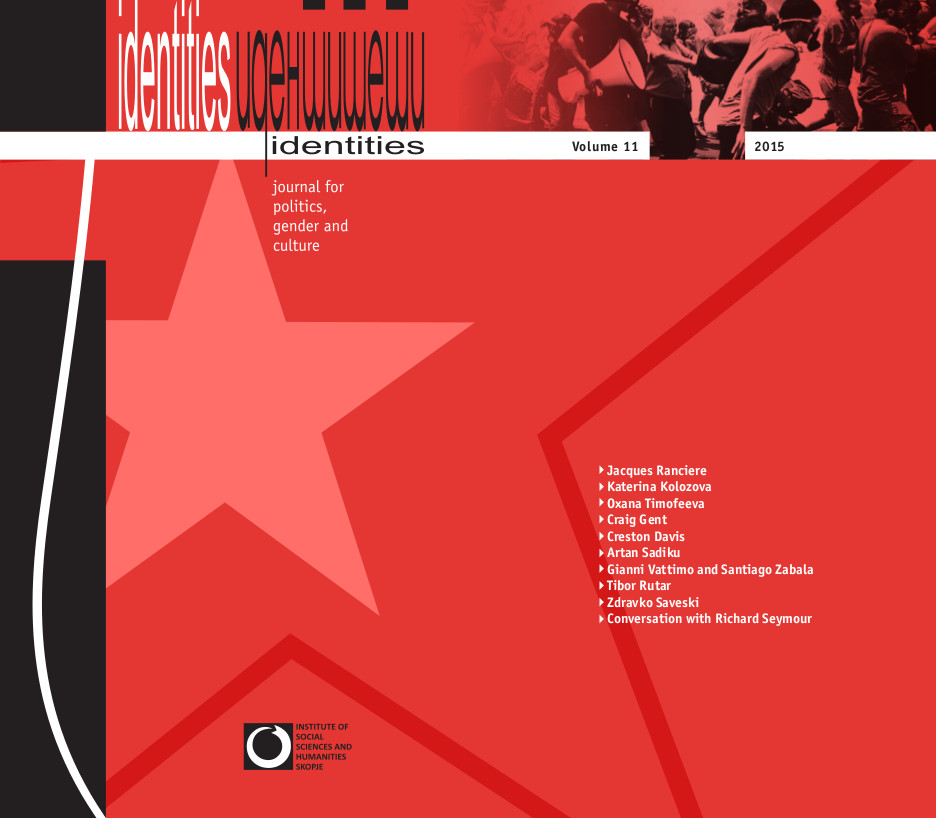Identities, Journal for Politics, Gender and Culture, 11: The Future of the Idea of the Left (2015)
Filed under journal | Tags: · capitalism, community, democracy, economy, left, marxism, metaphysics, philosophy, politics, theory

Identities “is a peer reviewed international journal that seeks to serve as a platform for the theoretical production of Southeastern Europe and enable its visibility and an opening for international debate with authors from both the ‘intellectual centers’ and the ‘intellectual margins’ of the world. It is particularly interested in promoting theoretical investigations which see issues of politic, gender and culture as inextricably interrelated.”
With contributions by Jacques Rancière, Katerina Kolozova, Oxana Timofeeva, Craig Gent, Creston Davis, Artan Sadiku, Gianni Vattimo and Santiago Zabala, Tibor Rutar, Zdravko Saveski, and Richard Seymour.
Edited by Katerina Kolozova and Žarko Trajanovski
Publisher Institute of Social Sciences and Humanities, Skopje, 2015
Open Access
ISSN 1857-8616
129 pages
Tony Harris: The Legacy of Cornelius Cardew (2013)
Filed under book | Tags: · avant-garde, biography, bourgeoisie, communism, composition, marxism, music, notation, politics

“Cornelius Cardew is an enigma. Depending on which sources one consults he is either an influential and iconic figure of British musical culture or a marginal curiosity, a footnote to a misguided musical phenomenon. He is both praised for his uncompromising commitment to world-changing politics, and mocked for being blindly caught up in a maelstrom of naïve political folly. His works are both widely lauded as landmark achievements of the British avant-garde and ridiculed as an archaic and irrelevant footnote to the established musical culture. Even the events of his death are shrouded in mystery and lack a sense of closure.
As long ago as 1967, Morton Feldman cited Cardew as an influential figure, central to the future of modern music-making. The extent to which Cardew has been a central figure and a force for new ideas in music forms the backbone to this book. Harris demonstrates that Cardew was an original thinker, a charismatic leader, an able facilitator, and a committed activist. He argues that Cardew exerted considerable influence on numerous individuals and groups, but also demonstrates how the composer’s significance has been variously underestimated, undermined and misrepresented.
Cardew’s diverse body of work and activity is here given coherence by its sharing in the values and principles that underpinned the composer’s world view. The apparently disparate and contradictory episodes of Cardew’s career are shown to be fused by a cohesive ‘Cardew aesthetic’ that permeates the man, his politics and his music.”
Publisher Ashgate, 2013
ISBN 140944810X, 9781409448105
228 pages
Reviews: Bruce Coates (Jems, 2013), Virginia Anderson (Music and Letters, 2013), Christopher Hobbs (NABMSA, 2013).
EPUB (updated on 2019-2-27)
Comment (0)Greil Marcus: Lipstick Traces: A Secret History of the Twentieth Century (1989–) [EN, ES, TR]
Filed under book | Tags: · 1968, anarchism, art, avant-garde, communism, dada, history, lettrism, marxism, music, nazism, popular culture, punk, situationists, surrealism

“Greil Marcus began work on this book out of a fascination with the Sex Pistols: that scandalous antimusical group, invented in London in 1975 and dead within two years, which sparked the emergence of the culture called punk. “I am an antichrist!” shouted singer Johnny Rotten—where in the world of pop music did that come from? Looking for an answer, with a high sense of the drama of the journey, Marcus takes us down the dark paths of counterhistory, a route of blasphemy, adventure, and surprise.
This is no mere search for cultural antecedents. Instead, what Marcus so brilliantly shows is that various kinds of angry, absolute demands—demands on society, art, and all the governing structures of everyday life—seem to be coded in phrases, images, and actions passed on invisibly, but inevitably, by people quite unaware of each other. Marcus lets us hear strange yet familiar voices: of such heretics as the Brethren of the Free Spirit in medieval Europe and the Ranters in seventeenth-century England; the dadaists in Zurich in 1916 and Berlin in 1918, wearing death masks, chanting glossolalia; one Michel Mourre, who in 1950 took over Easter Mass at Notre-Dame to proclaim the death of God; the Lettrist International and the Situationist International, small groups of Paris—based artists and writers surrounding Guy Debord, who produced blank-screen films, prophetic graffiti, and perhaps the most provocative social criticism of the 1950s and ’60s; the rioting students and workers of May ’68, scrawling cryptic slogans on city walls and bringing France to a halt; the Sex Pistols in London, recording the savage “Anarchy in the U.K.” and “God Save the Queen.”
Although the Sex Pistols shape the beginning and the end of the story, Lipstick Traces is not a book about music; it is about a common voice, discovered and transmitted in many forms. Working from scores of previously unexamined and untranslated essays, manifestos, and filmscripts, from old photographs, dada sound poetry, punk songs, collages, and classic texts from Marx to Henri Lefebvre, Marcus takes us deep behind the acknowledged events of our era, into a hidden tradition of moments that would seem imaginary except for the fact that they are real: a tradition of shared utopias, solitary refusals, impossible demands, and unexplained disappearances. Written with grace and force, humor and an insistent sense of tragedy and danger, Lipstick Traces tells a story as disruptive and compelling as the century itself.”
Publisher The Belknap Press of Harvard University Press, Cambridge/MA, 1989
Twentieth Anniversary Edition, 2009
ISBN 0674034805, 9780674034808
496 pages
via missionsamurai
Radio interview with author (30 min, KCRW, 1989)
Interview with author (Simon Reynolds, Los Angeles Review of Books, 2012)
Reviews: Simon Reynolds (Melody Maker, 1989), Jerome McGann (London Review of Books, 1989), Jon Erickson (Discourse, 1989-1990), Steve Redhead (Popular Music, 1990), Libero Andreotti (J Architectural Education, 1996).
Lipstick Traces (English, 1989/2009, EPUB, 5 MB)
Rastros de carmín. Una historia secreta del siglo XX (Spanish, trans. Damián Alou, 1993, 13 MB)
Ruj Lekesi: Yirminci Yüzyılın Gizli Tarihi (Turkish, trans. Gürol Koca, 1999, 29 MB)

